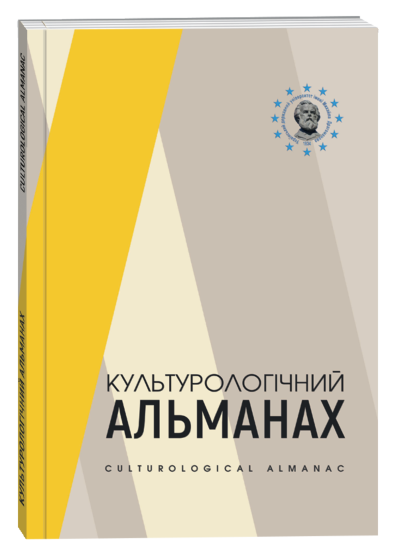HISTORICAL INFORMATION AS A SOURCE OF FORMATION OF NATIONAL IDENTITY
DOI:
https://doi.org/10.31392/cult.alm.2023.2.14Keywords:
historical information, national identity, Volynska zemlya, educationaland institution, brotherhoods, Cossacks, historical and cultural traditions.Abstract
The scientific research substantiates the role of historical information as a source of formation of Ukrainian national identity. The aspects that determine the value of the influence of cultural traditions, science and educational processes in the Volyn region in the continuity of generations are highlighted. The importance of historical and cultural influences that generate source content and project important information onto modern history and culture, develop relevant historical and cultural studies into problems has been established. On the basis of the analyzed sources and scientific studies of historians, individual stages of development of the Volyn land are outlined. Ithighlights the general patternsand settlement of its territory by Slavic tribes since prehistoric times. The main tendencies of formation, state, peculiarities of development and changes of historical and cultural traditions of Ukrainian tribes are characterized. The process of transformation of the names of tribes – indigenous inhabitants of Volyn, which in the first half of the ninth century became known as Volynians, is analyzed. It was found out that Volyn, being at the crossroads of historical paths, was one of the centers of education and culture of Ancient Rus. It is proved that in the XVI and early XVII centuries it was Volyn that lay one of the prominent places in the cultural and educational movement of Ukraine. The emergence of nationality resulted in the creation of a number of educational institutions and a system of fraternities. In particular, at that time the Ostroh Academy began its educational and scientific activities, the Lutsk Holy Cross Brotherhood and a school were founded. Their Christian educational orientation contributed to the consolidation of progressive forces of the Ukrainian population in its struggle for their social and national liberation. The leading place in the deepening and in the society of national identity of that time undoubtedly belonged to the Cossacks – the causative agent and generator of the nationally identifying potential of the nation. The Cossacks were known as the leader and spokesman of the national aspirations and interests of the entire Ukrainian people. It can be argued that despite the stated indicators of national identity, its general state requires significant activation and increase and involvement in the development of state-building processes. The spiritual foundations and mechanisms of the formation of national identity are a progressive and continuous process.
References
«Роде наш красний…» (Волинь у долях краян і людських документах) (1996) : у 3-х т. Т. 2. / авт.-упоряд. Л. К. Оляндер, Л. В. Бублейник, М. М. Кучерепа. Луцьк : Волинський національний університет імені Лесі Українки. 443 с.
Батюшков Н. Н. (1992) Волынь. Исторические судьбы Юго-Западного края. Передрук Волинської єпархії. Луцьк. 414 с.
Берестецька битва (2020). Рівненське обласне об’єднання Всеукраїнського товариства «Просвіта» імені Т. Шевченка URL: http://prosvita.rv.ua/index.php?option=com_content&view=article&id=109&Itemid=109.
Бухало О. (2021) Битва під Берестечком: як поразка козаків, яку прославляла Москва, об’єднала українців. BBC News Україна. 02 липня. URL: https://www.bbc.com/ukrainian/blog-history-57651619.
Вдовенко І. С. Формування національної самосвідомості учнівської та студентської молоді в процесі технологічної освіти. Науковий часопис НПУ імені М. П. Драгоманова. Серія. Педагогічні науки: реалії та перспективи. 2015. Вип. 52. С. 51–57.
Гуртовий Г. О. Волинь – край козацький: Історико-краєзнавчі нариси. Вид. друге, доп., уточн. Луцьк : Надстир’я, 2009. 388 с.
Діячі освіти та науки. Галшка Василівна Гулевичівна (2022). Коротка біографія. Електронна бібліотека Князєва. URL: https://www.ebk.net.ua/Book/biographies/d_o_t_n/part2/207.htm.
Левкович І. Нарис історії Волинської землі (до 1914 року). Праці Інституту дослідів Волині за редакцією д-ра Ю. Мушка-Луцика. Вінніпег : Накладом «Волинського видавничого фонду», 1953. 159 с.
Лук’янюк В. Цей день в історії. Битва під Берестечком. URL: https://www.jnsm.com.ua/h/0628P/.
Маланюк Є. Нариси з історії нашої культури. Київ : АТ «Обереги», 1992. 80 с.
Михайлюк О.Г., Кічій І.В. Історія Луцька. Львів : Світ, 1991. 192 с.
Сергійчук В. Український здвиг: Волинь. 1939–1955. Київ : Українська видавнича спілка, 2005. 840 с.
Стаценко Д. (2021) Слово і назва Україна: від Київського літопису до Богдана Хмельницького. Історична правда. 06 квітня. URL: https://www.istpravda.com.ua/articles/2021/04/6/159278/.
Струбицький В.В. Тут закладалися основи національної школи. «Роде наш красний...» (Волинь у долях краян і людських документах) : у 3-х т. Том І. / авт.-упоряд. Л. К. Оляндер, Л. В. Бублейник, М. М. Кучерепа. Луцьк : Волинський національний університет імені Лесі Українки, 1996. 443 с.








